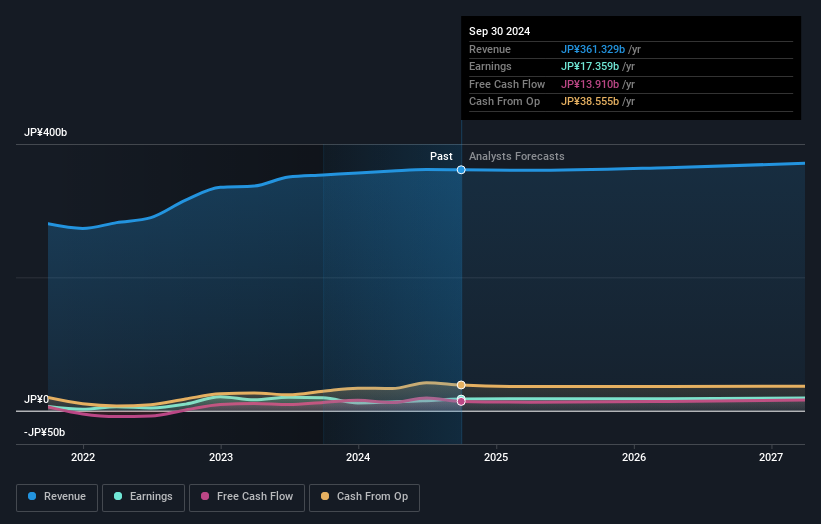- Japan
- /
- Consumer Durables
- /
- TSE:6632
Institutions profited after JVCKENWOOD Corporation's (TSE:6632) market cap rose JP¥15b last week but individual investors profited the most

Key Insights
- The considerable ownership by individual investors in JVCKENWOOD indicates that they collectively have a greater say in management and business strategy
- A total of 25 investors have a majority stake in the company with 42% ownership
- Institutional ownership in JVCKENWOOD is 42%
To get a sense of who is truly in control of JVCKENWOOD Corporation (TSE:6632), it is important to understand the ownership structure of the business. And the group that holds the biggest piece of the pie are individual investors with 57% ownership. In other words, the group stands to gain the most (or lose the most) from their investment into the company.
While individual investors were the group that benefitted the most from last week’s JP¥15b market cap gain, institutions too had a 42% share in those profits.
Let's take a closer look to see what the different types of shareholders can tell us about JVCKENWOOD.
Check out our latest analysis for JVCKENWOOD

What Does The Institutional Ownership Tell Us About JVCKENWOOD?
Institutional investors commonly compare their own returns to the returns of a commonly followed index. So they generally do consider buying larger companies that are included in the relevant benchmark index.
JVCKENWOOD already has institutions on the share registry. Indeed, they own a respectable stake in the company. This implies the analysts working for those institutions have looked at the stock and they like it. But just like anyone else, they could be wrong. If multiple institutions change their view on a stock at the same time, you could see the share price drop fast. It's therefore worth looking at JVCKENWOOD's earnings history below. Of course, the future is what really matters.

Hedge funds don't have many shares in JVCKENWOOD. Asset Management One Co., Ltd. is currently the largest shareholder, with 6.9% of shares outstanding. Meanwhile, the second and third largest shareholders, hold 4.2% and 3.8%, of the shares outstanding, respectively.
On studying our ownership data, we found that 25 of the top shareholders collectively own less than 50% of the share register, implying that no single individual has a majority interest.
Researching institutional ownership is a good way to gauge and filter a stock's expected performance. The same can be achieved by studying analyst sentiments. While there is some analyst coverage, the company is probably not widely covered. So it could gain more attention, down the track.
Insider Ownership Of JVCKENWOOD
The definition of company insiders can be subjective and does vary between jurisdictions. Our data reflects individual insiders, capturing board members at the very least. The company management answer to the board and the latter should represent the interests of shareholders. Notably, sometimes top-level managers are on the board themselves.
Most consider insider ownership a positive because it can indicate the board is well aligned with other shareholders. However, on some occasions too much power is concentrated within this group.
Our most recent data indicates that insiders own less than 1% of JVCKENWOOD Corporation. It is a pretty big company, so it would be possible for board members to own a meaningful interest in the company, without owning much of a proportional interest. In this case, they own around JP¥1.9b worth of shares (at current prices). It is good to see board members owning shares, but it might be worth checking if those insiders have been buying.
General Public Ownership
The general public, mostly comprising of individual investors, collectively holds 57% of JVCKENWOOD shares. This level of ownership gives investors from the wider public some power to sway key policy decisions such as board composition, executive compensation, and the dividend payout ratio.
Next Steps:
I find it very interesting to look at who exactly owns a company. But to truly gain insight, we need to consider other information, too. Case in point: We've spotted 1 warning sign for JVCKENWOOD you should be aware of.
If you would prefer discover what analysts are predicting in terms of future growth, do not miss this free report on analyst forecasts.
NB: Figures in this article are calculated using data from the last twelve months, which refer to the 12-month period ending on the last date of the month the financial statement is dated. This may not be consistent with full year annual report figures.
New: Manage All Your Stock Portfolios in One Place
We've created the ultimate portfolio companion for stock investors, and it's free.
• Connect an unlimited number of Portfolios and see your total in one currency
• Be alerted to new Warning Signs or Risks via email or mobile
• Track the Fair Value of your stocks
Have feedback on this article? Concerned about the content? Get in touch with us directly. Alternatively, email editorial-team (at) simplywallst.com.
This article by Simply Wall St is general in nature. We provide commentary based on historical data and analyst forecasts only using an unbiased methodology and our articles are not intended to be financial advice. It does not constitute a recommendation to buy or sell any stock, and does not take account of your objectives, or your financial situation. We aim to bring you long-term focused analysis driven by fundamental data. Note that our analysis may not factor in the latest price-sensitive company announcements or qualitative material. Simply Wall St has no position in any stocks mentioned.
About TSE:6632
JVCKENWOOD
Manufactures and sells products in the mobility and telematics services, public service, and media service sectors in Japan and internationally.
Flawless balance sheet and fair value.

